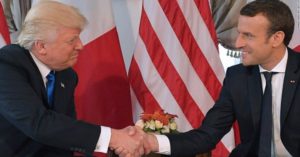 Handshakes have been in the news lately. On his overseas trip, President Trump greeted a number of world leaders, usually with a handshake. The President, according to CNN, “seems to view the handshake as a sort of battle of wills and a battle for power all wrapped into one”. The CNN article discusses a number of examples. Most recently, there was a lengthy, combative handshake with France’s new President, Emmanuel Macron. According to a Washington Post reporter, “They shook hands for an extended period of time. Each president gripped the other’s hand with considerable intensity, their knuckles turning white and their jaws clenching and faces tightening”. Handshakes most often are a simple component of a greeting or departure ritual. But sometimes they have more significance. In an interview yesterday in France Dimanche, Macron said this about the handshake: “Ma poignée de main avec lui, ce n’est pas innocent…Il faut montrer qu’on ne fera pas de petites concessions, même symboliques” (My handshake with him was not without significance…It’s important to demonstrate that there will be no small concessions, even those of a symbolic nature). Macon was using the handshake as a gesture of defiance and independence, resisting the alpha male persona of the US President.
Handshakes have been in the news lately. On his overseas trip, President Trump greeted a number of world leaders, usually with a handshake. The President, according to CNN, “seems to view the handshake as a sort of battle of wills and a battle for power all wrapped into one”. The CNN article discusses a number of examples. Most recently, there was a lengthy, combative handshake with France’s new President, Emmanuel Macron. According to a Washington Post reporter, “They shook hands for an extended period of time. Each president gripped the other’s hand with considerable intensity, their knuckles turning white and their jaws clenching and faces tightening”. Handshakes most often are a simple component of a greeting or departure ritual. But sometimes they have more significance. In an interview yesterday in France Dimanche, Macron said this about the handshake: “Ma poignée de main avec lui, ce n’est pas innocent…Il faut montrer qu’on ne fera pas de petites concessions, même symboliques” (My handshake with him was not without significance…It’s important to demonstrate that there will be no small concessions, even those of a symbolic nature). Macon was using the handshake as a gesture of defiance and independence, resisting the alpha male persona of the US President.
In the US a “firm” handshake, along with the pulling and tugging often used by Trump, is seen as normal male behavior in the business community. It’s not the same in the rest of the world; a handshake is seen as a friendly gesture, not an opportunity to be aggressive and show dominance. As commentator Joe Navarro remarks, that is particularly the case in diplomatic circles: “Diplomacy is about getting along. One of the things we do with our handshakes is we establish comfort. We’re saying, ‘I’m your friend. I’m the person you’re going to be working with.’ That’s what the handshake is supposed to be for, not some sort of sophomoric challenge between two alpha males.” In some parts of the world, business transactions, including negotiating over prices, occurs while men continue to hold hands. In that case, it is less a contest of wills, than it is a symbol of working together to reach consensus. Not a bad model for diplomacy.
